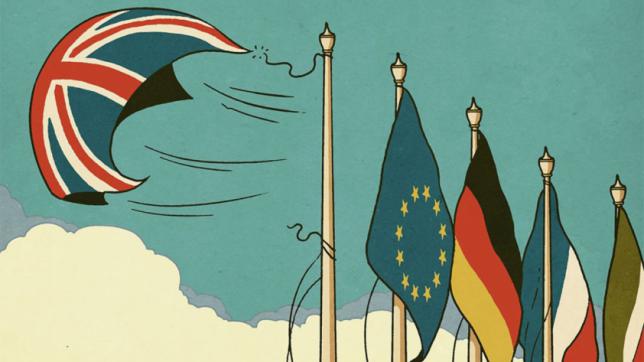Published in The Daily Star on Monday, 27 June 2016
MACRO MIRROR
Brexit: Rise of neo-nationalism and protectionism? – Dr Fahmida Khatun
 While European leaders dreamt of an intertwined economy across Europe 43 years ago, the British people desired something else. They wanted their country to be exclusively theirs and not be shared by outsiders. Brexit shows that conservatism prevails strongly deep in the hearts of people even in richer, more developed countries. They do not want others to share their privileges, their benefits and their rights. Hence, they gave their verdict to retain the sole possession of their country by choosing to exit Europe on June 23, 2016.
While European leaders dreamt of an intertwined economy across Europe 43 years ago, the British people desired something else. They wanted their country to be exclusively theirs and not be shared by outsiders. Brexit shows that conservatism prevails strongly deep in the hearts of people even in richer, more developed countries. They do not want others to share their privileges, their benefits and their rights. Hence, they gave their verdict to retain the sole possession of their country by choosing to exit Europe on June 23, 2016.
The wounds of Brexit will flow from Europe to North American to Asia. Though post-Brexit development is still evolving and will continue to do so in the coming days and months, the scale of impact on the British and world economy is still unclear. The impact of Brexit on the financial market was felt immediately, but the economic impact will be felt gradually in the medium and long term. Turbulence in the capital and investment market has also been felt strongly. The currency market plunged, as the British pound fell by 10 percent against the USD, which is at its lowest in 31 years. Low investment, slow job creation and lower growth is feared to follow in the medium term, thereby possibly reducing the size of the British economy. The impact of a depressed British economy will be felt one way or the other by each and every country having even the remotest connection with the UK.
The potential fallout of Brexit will be felt by Bangladesh in a number of areas including trade, investment, aid, remittances and migration. Bangladesh’s economy is linked with that of the UK’s in several ways. Bangladesh exports more than USD 3 billion to the UK, of which 90 percent constitute readymade garments. Thus, the UK is Bangladesh’s third largest export destination, followed by the US and Germany. One of the reasons for increased exports to the UK is the duty-free quota-free (DFQF) market access of Bangladeshi exports to the EU market under the Everything But Arms (EBA) initiative, which Bangladesh has been enjoying as a Least Developed Country since 1971. Even though the global tariff regime is being negotiated at the World Trade Organisation (WTO) towards deeper tariff cuts for higher global trade, Brexit may push countries to impose tariffs on imports, in order to protect their domestic industries in the face of pressure on their economy. The spirit of the WTO for trade liberalisation will thus be undermined, as countries could experience protectionism in its new facet.
With the UK leaving the EU, exports from Bangladesh may be affected in a number of ways. First, Bangladeshi exporters will earn less as they will lose the DFQF facility, which saves 12.5 percent duty on Bangladeshi exports. This will erode the competitiveness of Bangladeshi exports. Second, as the European and British economies will experience instability, there would be depressed demand among people. Full implementation of Brexit will take at least two years. So, there is no immediate concern about losing the DFQF privilege. This is a breathing space that should be utilised efficiently by Bangladesh to continue its DFQF status in the UK.

In case of remittance, there may be sluggishness in the short run, as Bangladeshi migrants will be discouraged to do so in the face of currency fall. Notably, a significant share of Bangladesh’s remittance – over USD 1 billion – comes from the UK, where Bangladeshi migrants are working. Brexit is said to have been influenced mainly by the migration issue. The British people, particularly the older generation, felt threatened by the flow of migrants into their country and ‘taking’ a part of their jobs, health services and other facilities. Taking cues from this, the British immigration regime may become stricter resulting in less Bangladeshis getting immigration visa. If the size of the British economy does not expand enough, immigration may continue to be tougher. Bangladeshi job seekers will find it more difficult to get jobs in the UK.
The UK is among the six countries in the world which has fulfilled the commitments of providing 0.7 percent of its Gross National Income as overseas development assistance. In fact, even after the financial crisis of 2008, the UK increased its aid flow. The UK is Bangladesh’s second highest bi-lateral donor. Any change in their aid policy will have an impact on Bangladesh’s development efforts. It is also the destination of a large number of Bangladeshi students, many of whom receive scholarships from the UK. Brexit brings uncertainty on the continuation of such opportunities for aspirant Bangladeshi students.
Now, through Britain’s separation from the EU, countries across the globe will have to face new realities in defining their economic and political relationship with the UK and the EU. But the journey ahead is surely not going to be a smooth one. Brexit has shown the way to others. Ramifications of Brexit is apprehended to lead towards the beginning of the end for Europe and conservatism in the US. France and Germany may follow suit, destroying the European integration to the fullest. Donald Trump could get a boost for his anti-immigration populist policy in his election campaign.
Obviously, benefits of a global economic system have not been enjoyed equally by everyone. The global institutions were the only ones to determine the terms for the citizens of countries, sometimes against their will. This has created distrust and suspicion about globalisation and given rise to neo-nationalism. It is also a step towards protectionism that will separate the global economy instead of further integration. And global leaders will not be able to revert the trend with existing economic policies and political decisions in place.
The writer is Research Director at the Centre for Policy Dialogue.

